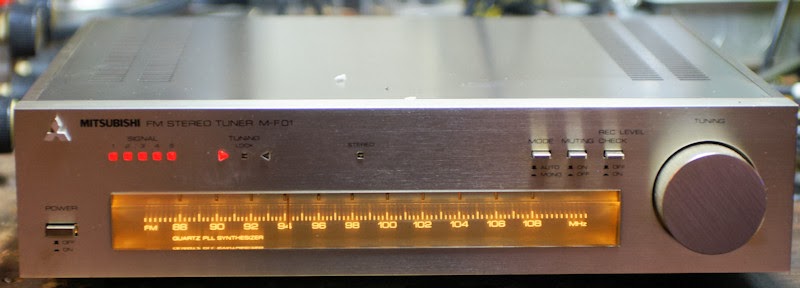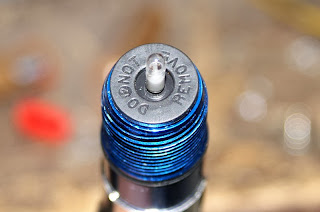After years of miserly waiting, I have acquired my first tube integrated
amp from ebay, (Since the one who shall remain nameless) threw away my
"The Fisher 400" Receiver while I was at college in the 80's. This one
arrived Friday 10-19-2013
It was listed as an "unknown amp" I did
some sleuthing and found that it was either a Radio shack, National
Radio, or a Merrell kit amp.
We'll call it a
Merrell SA-30 for now.
Auction pics
Gratuitous glowing artsy tube picture.
I went to my local surplus place and found the ONLY 5u4gb they had. I
paid $6 for it. I had one 6v6, and scrounged 3 more from my Newcomb
B-100 Radios. I got 2 - 12at7a's from the B&K television analyst I
parted out. I got 1 - 12ax7a from the same B&K and I had another
marked Silvertone. At the suggestion of Tube Radio (an Antique Radios Forum member), I also replaced all
the ceramic capacitors with other non ceramic caps. It is up and running
and I am playing my MP3 player through it now. It needs some tweaking
and maybe some matched tubes.

Things I found wrong with it.
There is a large 25 watt? 200ohm resistor that (whoever wired it
originally) had used WAY too thin wire. The wire was scorched on either
side of the resistor. I replaced it with some larger wire. There is a
fluttering/static noise when the selector is on Lo Phone/Tape. The Lo
Phono connection has more gain than the other inputs. This means it
works real well for my Mp3 player. I can drop the volume on the player
down to 50% when hooked up there.
In the picture above of the
back of the amp, there are 4 connections for each speaker. I determined
that the far right connection is common, the other connections are from
left to right. 4ohm, 8ohm, 16ohm. I input a sign wave in to the unit and
noted that the amplitude of the wave increased as I went from right to
left. The 2 RCA connections below the left
speaker connectors. They are not Left and Right Tape out.
The unit supposedly does NARTB
equalizing on the phono inputs (I cannot tell).
After about 2 hours listening the Power transformer gets to be about 140°f.
I need to:
get matched tubes for it, though it plays pretty good with the hodge podge that I have in it.
make a cage/cover for it, it had one at some point and there are screw holes for one.
Make a wood base for it.
Properly label everything on the back and remove all the marking pen marks on it.
The filament voltage for the 5U4 on this this amp was over 7 volts A/C, it should be 5. I did some research
and calculations that to drop 7.16 volts to 5 volts at 3 amps would take
about .76 ohms 6.5 watts. I knew from past experience that it would
probably not be that exact a resistor. Most calculators I found said it
would take a 1 ohm 6.5 watt resistor.
I picked up 2 - 1 ohm 10
watt resistors. I found that 1 - 1 ohm resistor dropped the voltage down
to about 3.5 volts. I tested the 2 resistors in parallel for .5 ohms.
That brought the voltage down to 5.07 volts

They do get pretty hot.
For now they are mounted sub chassis on a standoff in free air.
For anyone that is interested here is the Schematic.
Right click and open in a new tab or window. Then save the jpg. The notations on the drawing are not mine. The Filter Capacitors are not marked on the schematic and I do not know the correct values. However my amp had 40uf 350v and 20uf 350v multi section caps installed. I would replace them on both channels with 40uf 450v electrolytic caps. There is also a 200 ohm 25watt resistor coming off of the 5u4 pin 8, and before the first filter cap. I am thinking that someone put that in there to limit the voltage because without it the screen grid voltages on the 6V6 tubes is 32 volts to high.
Here are the original catalog ads for the amp.
Here is the schematic after I changed it to match my amp and making the mods that improve bass.

















































